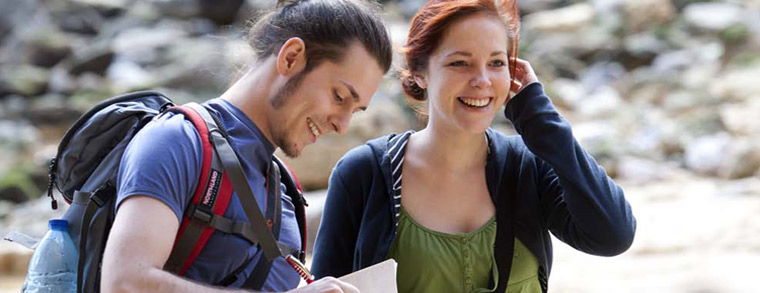IFiT Train the Trainers
IFiTtrain-the-trainers workshops
This multidisziplinary, international training course in Aljezur enables staff to plan, manage and innovate field work and off-site activities in a variety of environments. Leading field scientists from Osnabrück University, University of Lisbon, and the University College Cork provide inspiration and practical advice for planning and implementing successful field courses. The emphasis is placed on sharing ideas and experiences from the fields of biology, geography and geology and to provide an inside in how different nations run field courses. The workshop will help teaching and non-teaching staff to gain innovative ideas, forge new professional contacts and to promote the values of field work within their institution. .topics covered The course is thematic and multidisciplinary with input from the academic fields of biology, geology, geography, environmental and social sciences. Short, contextualised presentations provide a theoretical framework, initiate lively discussions and underpin practical activities in the field. Interactivity is key. Participants are invited to report their own experiences and share their opinion and know-how with like-minded people in a relaxed and informal environment.
This
course is for Osnabrück University, University of Lisbon, and the University
College Cork staff members. The course
is equally suited for early career academics who have not lead an off-site
activity before and experienced colleagues who offer to share their knowledge
to keep field courses firmly on the agenda of HE teaching. PhD students, technicians and admin staff are
specifically invited to participate and to contribute. |
fast facts
topics : |
indicative course itinerary
|
Day 1 Morning: arrival in Aljezur / Afternoon: site visits / networking |
| Snack lunch and coffee |
| Introduction
to the IFiT project. Presentation of team members and
participants: home institution, subject area, expectations of the participants, materials to share with the group. |
|
Site visits: Arrifana harbour, Monte Clerigo or Amoreira beach. |
| Networking: Introduction to the IFiT network database and project communication software |
| Participatory design: field courses in the context of HE education, challenges and opportunities |
| Evening meal |
| Day 2 Morning: Educational tools and how to use them / Afternoon: Field exercises and project work |
| Breakfast buffet |
| Backward Design: Maximising the student experience. Fine-tuning learning outcomes, innovative assessments and design suitable field exercises. Field pedagogy: maximising student engagement and experience, facilitating deep learning |
| Field equipment (optional mini-workshop): innovative field equipment, discuss availability, portability, costs, educational value and practicalities. Advice on how to build your own field equipment. |
| Data management (optional mini-workshop): how to use data collected by students efficiently for environmental monitoring, research and to engage the local community. Introductions to Epicollect, Slack, Zenodo etc. |
| Mental and physical health (optional mini-workshop): how to notice and accomodate students (and staff!) with particular needs, mentoring, emergency responses |
|
Snack lunch and coffee break |
| Guided walk: What works and what doesn´t: practical demonstration of a range of projects, equipment and field exercises. |
| Evening meal |
| Day 3 Morning: Logistics / Afternoon: field pedagogy |
| Breakfast buffet |
|
Logistics: The mechanics of a field course. Details of planning and running a field course |
|
Snack lunch and coffee break |
| Outdoor session at coastal site: design effective field activities. Practical activity geo-do-bio-do-geo followed by group discussion. |
| Evening meal |
| Day 4 Morning: feedback and feedforward / Afternoon: Departure (optional site visits or activities) |
| Breakfast buffet |
| Innovations in outdoor teaching: link to employability (stakeholder involvement in field courses), citizen science, joint field courses, international sharing, inter- and transdisciplinarity in field work |
|
Setting an itinerary: planning a field course considering
the rhythm of activities, optimum length, |
| Summary, feedback, evaluation, hand out of certificates |
| Snack lunch and coffee break |
| Transit to airport or bus station. |
| Alternatives (for late departure): Boat tour to Olhao barrier island system or trip to Monchique syenite / hot spring hydrology / fire sites or visit Carrapateira dune system or cycle tour |
The schedule will vary. Weather conditions and the preferences of the group will shape the daily schedule. Please try to be flexible and understand that working in nature cannot be 100% predictable.
details and prices
The IFiT Train-the-Trainers workshops run for four days from
Thursday to Sunday. The workshops are fully catered starting with
an all-you-can-eat breakfast buffet, a healthy salad lunch, coffee and
tea during the day and is rounded off with a delicious three course
evening meal (vegetarian or vegan, prepared with passion from mostly organic, locally
sourced ingredients).
⢠Fully catered ⢠All course materials included ⢠Carbon offset contribution
On completion of the workshop, participants will
receive a Certificate of Participation.
4 day course (all inclusive)
(EU Erasmus+ grants available)
Contact us for details.
our partners for the IFiT train-the-trainers workshops

back



